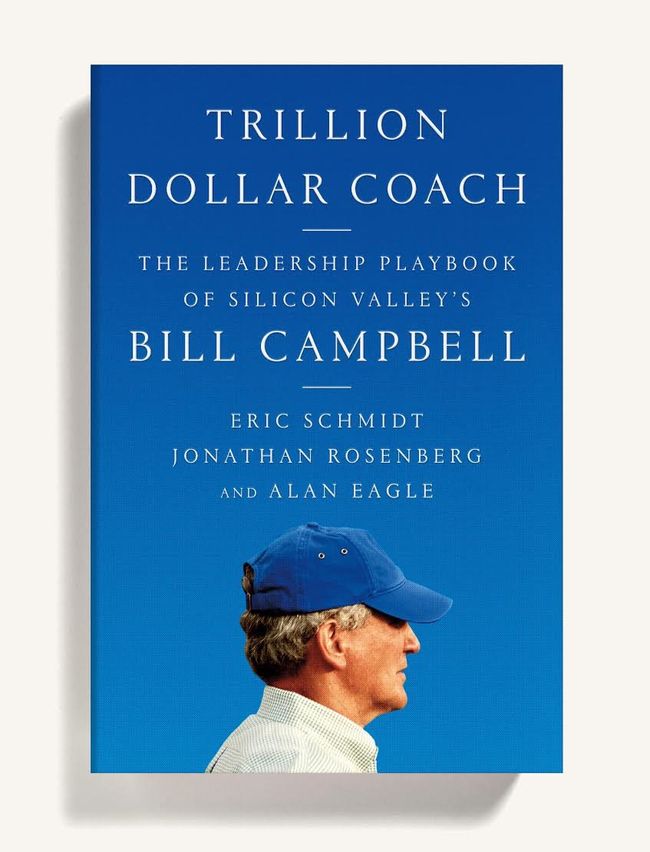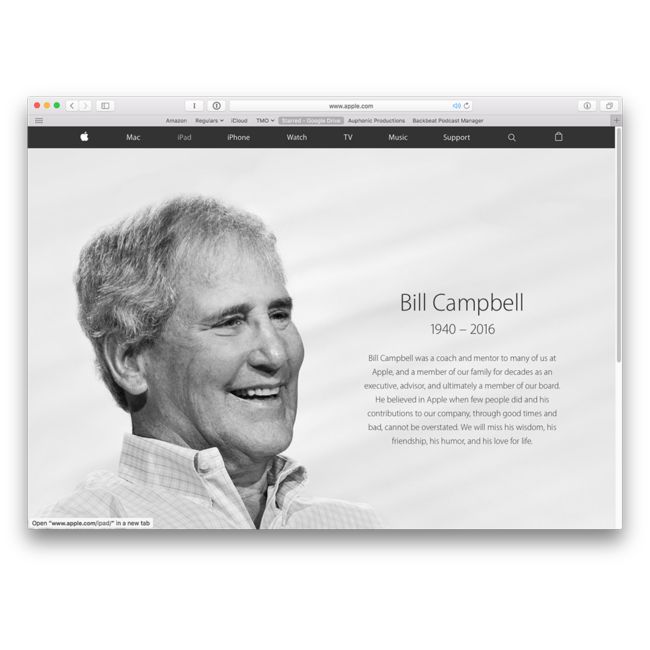这本书讲的是“硅谷最大的秘密” — 硅谷诸多大神创业者们的职业教练Bill Campbell。作者是谷歌2001-2011年间的CEO Eric Schmidt和高管Jonathan Rosenberg, Alan Eagle等人。
身高只有5英尺10英寸(1.78m),体重只有162 英镑(73kg),却曾是哥伦比亚大学橄榄球队的队长。37岁作为一个不成功的橄榄球教练,离开体育届,开始找第一份工作。通过当年球队的朋友介绍,在一家科技公司做销售,40 多岁才来到硅谷。
但后来,他辅导过的“创业者”包括乔布斯,谷歌的两个创始人和CEO,扎克伯格等等,这个名单,很“牛”,很长,以至于2016年他的葬礼上,有超过一千位硅谷科技和创投界的大佬参加,而且这上千个“牛人”都认为Bill是自己“最好的朋友”。他辅导过的人创立的公司加起来有万亿美金的市值,所以这本书称他为万亿美金教练。
You title makes you a manager. Your people make you a leader.
It's the people.
People are the foundation of any company's success. The primary job of each manager is to help people be more effective in their job and to grow and develop. We have great people who want to do well, are capable of doing great things, and come to work fired up to do them. Great people flourish in an environment that liberates and amplifies that energy. Managers create this environment through support, respect, and trust.
Support means giving people the tools, information, training, and coaching they need to succeed. It means continuous effort to develop people's skills, Great managers help people excel and grow.
Respect means understanding people's unique career goals and being sensitive to their life choices. It means helping people achieve these career goals in a way that is consistent with the needs of the company.
Trust means freeing people to do their jobs and to make decisions. It means knowing people want to do well and believing that they will. An important point: trust doesn't mean you always agree; in fact, it makes it easier to disagree with someone.
The top priority of any manager is the well-being and success of her people.
To build rapport and better relationships among team members, start team meetings with trip reports, or other types of more personal, non-business topics.
Have a structure for 1:1s, and take the time to prepare for them, as they are the best way to help people be more effective and to grow.
Bill's framework for 1:1s and reviews
Performance on job requirements:
Could be sales figures
Could be product delivery or product milestones
Could be customer feedback or product quality
Could be budget numbersRelationship with peer groups (this is critical for company integration and cohesiveness):
Product and Engineering
Marketing and Product
Sales and EngineeringManagement/Leadership
Are you guiding/coaching your people?
Are you wedding out the bad ones?
Are you working hard at hiring?
Are you able to get your people to do heroic things?Innovation (best practices)
Are you constantly moving ahead ... thinking about how to continually get better?
Are you constantly evaluating new technologies, new products, new practices?
Do you measure yourself against the best in the industry/world?
The manager's job is to run a decision-making process that ensures all perspectives get heard and considered, and, if necessary, to break ties and make the decision.
Lead based on first principles. Define the "first principles" for the situation, the immutable truths that are the foundation for the company or product, and help guide the decision from those principles.
Manage the aberrant genius. Aberrant geniuses - high performance but difficult team members - should be tolerated and even protected, as long as their behavior isn't unethical or abusive and their value outweighs the toll their behavior takes on management colleagues, and teams.
Money's not about money. Compensating people well demonstrates love and respect and ties them strongly to the goals of the company.
Innovation is where the crazy people have stature. The purpose of a company is to bring a product vision to life. All the other components are in service to product.
Heads held high. If you have to let people go, be generous, treat them well, and celebrate their accomplishments.
It is the CEO's job to manage boards. Not the other way around.
Only coach the coachable. The traits that make a person coachable include honesty and humility. The willingness to persevere and work hard, and a constant openness to learning.
Practice free-form listening. Listen to people with your full and undivided attention - Don't think ahead to what you're going to say next - and ask questions to get to the real issue.
No gap between statements and fact. Be relentlessly honest and candid, couple negative feedback with caring, give feedback as soon as possible, and if the feedback is negative, deliver it privately.
Don't stick it in their ear. Don't tell people what to do. Offer stories and help guide them to the best decisions for them.
Be the evangelist for courage. Believe in people more than they believe in themselves, and push them to be more courageous.
Full identity front and center. People are most effective when they can be completely themselves and bring their full identity to work.
Work the team, then the problem. When faced with a problem or opportunity, the first step is to ensure the right team is in place and working on it.
Pick the right players. The top characteristics to look for are smarts and hearts: The ability to learn fast, a willingness to work hard, integrity, grit, empathy, and a team-first attitude.
Pair people. Peer relationships are critical and often overlooked, so seek opportunities to pair people up on projects or decisions.
Get to the table. Winning depends on having the best team, and the best teams have more women.
Solve the biggest problem. Identify the biggest problem, the "Elephant in the Room", bring it front and center, and tackle it first.
Don't let the bitch sessions last. Air all the negative issues, but don't dwell on them. Move on as fast as possible.
Winning right. Strive on win, but always, win right, with commitment, teamwork, and integrity.
Leaders lead. When things are going bad, teams are looking for even more loyalty, commitment, and decisiveness from their leaders.
Fill the gaps between people. Listen, observe, and fill the communication and understanding gaps between people.
Permission to be empathetic. Leading teams becomes a lot more joyful, and the teams more effective, when you know and care about the people.
The lovely reset. To care about people you have to care about people: ask about their lives outside of work, understand their families, and when things get rough, show up.
The percussive clap. Cheer demonstrably for people and their successes.
Always build communities. Build communities inside and outside of work. A place is much stronger when people are connected.
Help people. Be generous with your time, connections, and other resources.
Love the founders. Hold a special reverence for - and protect - the people with the most vision and passion for the company.
The elevator chat. Loving colleagues in the workplace may be challenging, so practice it until it becomes more natural.


